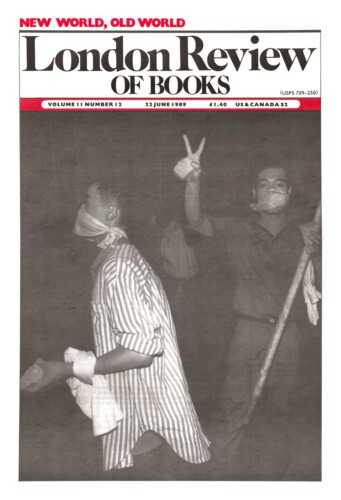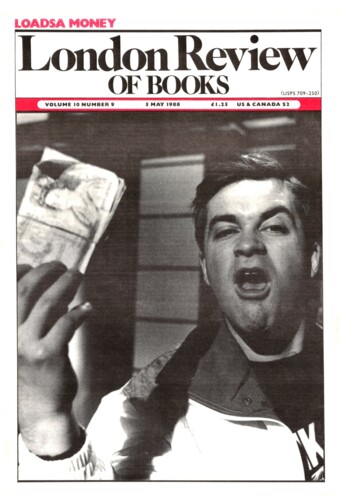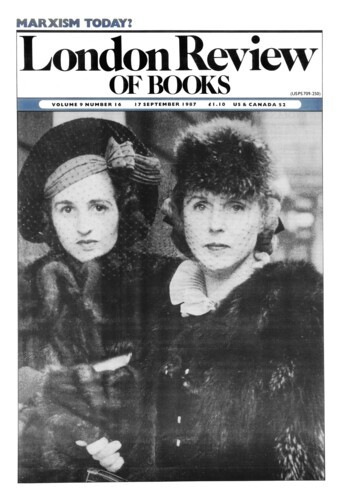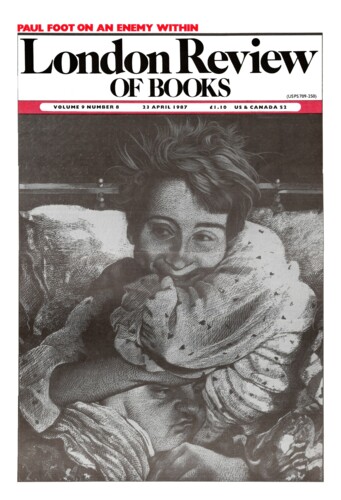Edna Longley
Edna Longley teaches at Queen’s University, Belfast. Her book Poetry in the Wars was reviewed by Patricia Craig on 19 February.
England and Other Women
Edna Longley, 5 May 1988
The structural ironies of Edward Thomas’s life still condition his reputation. Just as he made a late poetic start, so criticism has been slow to gather momentum. Even the recent spate of studies – by Michael Kirkham, Stan Smith, and the contributors to Jonathan Barker’s Art of Edward Thomas – seems more fortuitous than co-ordinated. Thomas, as Robert Frost reminded him, ‘knew the worth of [his] bays’. However, it is unwise to die in war when a hegemonic project like Modernism is getting under way. Frost’s reputation survived because, feigning simplicity, he appealed to the people, to readers, over the head of ‘the Pound-Eliot-Richards gang’. Frost initially marketed Thomas as well as himself in the US (‘I hadn’t a plan for the future that didn’t include him’): but this return for Thomas’s influential promotion of North of Boston lapsed after the latter’s death. The separation of Thomas and Frost along an Anglo-American dotted line distorts perspectives on early 20th-century poetry. A history so specific to poetry has been additionally marginalised by the Modernist convergence of literary modes. Thus Frost, and Thomas, can be omitted from poetry courses in American universities where Modernist orthodoxy prevails. Their combined critical as well as creative forces might dent this orthodoxy. Thomas’s review of Exultations (1909), no snap judgment, anticipated the direction of Pound’s career: ‘both in personal and detached poems he is, as a rule, so pestered with possible ways of saying a thing that at present we must be content to pronounce his condition still interesting – perhaps promising – certainly distressing. If he is not careful he will take to meaning what he says instead of saying what he means.’ As if in revenge, the hard-faced men who have done well out of Modernism either ignore Thomas’s poetry or patronise some fancied resemblance to Imagism – a movement he shrewdly criticised. The tendency to exclude Thomas from general discussion of modern poetry (panoptic views favour Modernism) not only severs his vital tie with Frost, but obscures his different affiliations to Yeats and Hardy. A few essays in The Art of Edward Thomas open out the issues, but a whiff of poet’s corner lingers on. Pace Peter Levi, it is not quite enough to celebrate Thomas as ‘certainly genuine, authentic, a true poet’.’
Diary: Ireland by Others
Edna Longley, 17 September 1987
On the 11th of July the Belfast-London shuttle was an airlift by jumbo-jet. But the exodus I joined had nothing to do with political panic. It meant holiday-time – ‘the Twelfth fortnight’. The Protestants left behind to march, and Catholics left behind to object to their marches, were mostly those who couldn’t afford Corfu. In The Crack: A Belfast Year Sally Belfrage notes: ‘A look at the class-composition’ of the Twelfth procession was ‘to see overwhelmingly the poor, albeit with the gentry to the fore, and it ill becomes middle-class snobs to sneer at this celebration of who they were.’ I was deserting this ‘genuine people’s festival’, this dangerously alive piece of folklore, for an academic conference on Irish drama. However, the dust of Ulster is not so easily shaken off: at the University of Caen there were video-clips of something called ‘the Northern play’, a dramatic form which now interests Continental professors. Searching for origins, they might turn to the first page of Northern Windows, where William Carleton tells how ‘for some years after the Rebellion of ’98 a bitter political resentment subsisted between Protestants and Catholics … The plays of the Siege of Londonderry and The Battle of Aughrim were acted in barns and waste houses every night.’ Back home, too, middle-class Belfast watches working-class Belfast on TV, in fact and fiction. But viewing the familiar mayhem at a seminar in France made me more conscious of the processes whereby a slice of life ends up as a critical category.
MacNeice and Ireland
23 April 1987
Pieces about Edna Longley in the LRB
Weasel, Magpie, Crow: Edward Thomas
Mark Ford, 1 January 2009
‘Prends l’éloquence et tords-lui son cou!’ Verlaine resonantly, and eloquently, declared in his ‘Art poétique’ of 1874. The line must have lodged in...
Like the trees on Primrose Hill
Samuel Hynes, 2 March 1989
In ‘The Cave of Making’, his elegy for MacNeice, Auden describes his friend as a ‘lover of women and Donegal’. The geography seems a bit wrong – the Irish counties...
Green War
Patricia Craig, 19 February 1987
Wars and battles: these words, appearing prominently in the titles of two of the books under consideration, might give the impression that poetry, or criticism, or the criticism of poetry, is a...
Valorising Valentine Brown
Patricia Craig, 5 September 1985
In a recent Times article, Philip Howard pounced on the deplorable word ‘Valorisation’ which seems to be trying to edge its way into the English language. ‘To enhance the price,...
Read anywhere with the London Review of Books app, available now from the App Store for Apple devices, Google Play for Android devices and Amazon for your Kindle Fire.
Sign up to our newsletter
For highlights from the latest issue, our archive and the blog, as well as news, events and exclusive promotions.




